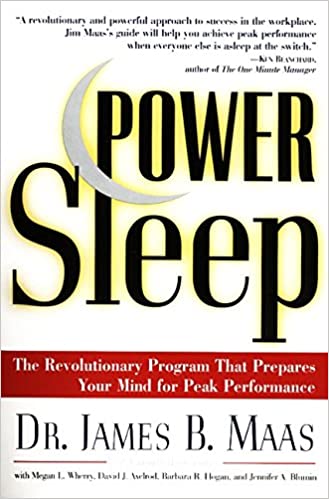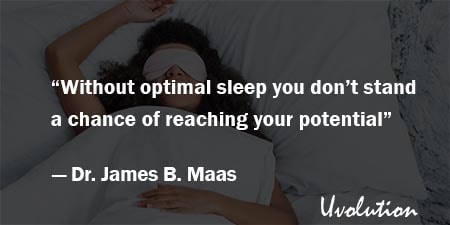Power Sleep by James Maas
The Book in 1 Sentences
Power Sleep : The Revolutionary Program That Prepares Your Mind for Peak Performance
“For anyone who wants to be successful, sleep is a necessity, not a luxury.
The conclusions presented in Power Sleep are based on recent studies of the neurological, chemical, and electrical activity of the sleeping brain, which show that even minimal sleep loss can have profound detrimental effects on mood, cognition, performance, productivity, communication skills, accident rates, and general health, including gastrointestinal system, cardiovascular functioning, and our immune systems.
Given the role of sleep in determining daytime functioning, most alarming to me is the current extent of sleep deprivation in our society. At least 50 percent of the American adult population is chronically sleep-deprived and a similar percentage report trouble sleeping on any given night. And it’s getting worse by the decade.
This devastating trend can be found throughout the industrialized world.
... If you understand exactly what the brain accomplishes during various stages of a night’s sleep and what your individual sleep requirement is, you’re in a position to become a very different person. People who learn about sleep come to value sleep and adopt better sleep habits.
After a few weeks they discover, perhaps for the first time, what it really feels like to be fully alert all day long. Their increased efficiency gives them enough hours in the day to work, and to play.
They become better spouses, better parents, and better in their careers. They become more
energetic, healthier, more successful, and happier with their lives. That’s life as it should be.” ~ Dr. James B. Maas
8 BIG Ideas
Power Sleep Book Summary
1. Why We Sleep?!
“The process of sleep, if given adequate time and the proper environment, provides tremendous power. It restores, rejuvenates, and energizes the body and brain.
The third of your life that you should spend sleeping has profound effects on the other two thirds of your life, in terms of alertness, energy, mood, body weight, perception, memory, thinking, reaction time, productivity, performance, communication skills, creativity, safety, and good health.”
“Sleep plays a major role in preparing the body and brain for an alert, productive, psychologically and physiologically healthy tomorrow.”
2. Are You Sleep-Deprived?
“Ask yourself:
How much sleep do I get each night during the week?
Does it differ on weekends?
Do I fall asleep the minute my head hits the pillow?
Do I need an alarm clock to wake me up?
If you’re getting less than eight hours of sleep each night, including weekends, or if you fall asleep instantly, or need an alarm clock to wake up, consider yourself one of the millions of chronically sleep-deprived people—perhaps blissfully ignorant of how sleepy and ineffective you are, or how dynamic you *could* be with adequate sleep.”
“Most of us need at least one more hour of sleep every night than we get. The consequences of gradual yet continuous sleep deprivation might not be readily apparent at first glance, but over time, the insidious sleepiness will begin to take its toll on your mood, your performance, and your health. Your education, your job, and your family and social life will be affected.”
“Often we are totally unaware of our own reduced capabilities because we become habituated to low levels of alertness. Many of us have been sleepy for such a long time that we don’t know what it’s like to feel wide awake.”
“If you need an alarm clock to wake you up, if you find it hard to get out of bed in the morning, or if you’re tired during the day, you haven’t slept enough.”
3. Ten Hours of Sleep!
“Before Thomas Edison’s invention of the electric light in 1879, most people slept ten hours each night, a duration we’ve just recently discovered is ideal for optimal performance.
When activity no longer was limited by the day’s natural light, sleep habits changed. Over the next century we gradually reduced our total nightly sleep time by 20 percent, to eight hours per night.
But that’s not nearly the end of the story. Recent studies indicate that Americans now average seven hours per night, approximately two and a half hours less than ideal. Amazingly, and foolishly, one third of our population is sleeping less than six hours each night. Are we losing our minds?”
So, “Ten hours of sleep is operationally defined as our need because that’s what is often required for optimal performance.”
“According to Dr. William Dement, chairman of the National Commission on Sleep Disorders Research, “The national sleep debt is larger and more important than the national financial debt.” Are you a contributor to this deficit? If so, you’re far from being the person you can be.”
4. Learn to “Power Sleep”
“We do not understand the need for sleep and the consequences of sleep deprivation. We must learn to value sleep as much as we value the importance of proper nutrition and exercise.
To become peak performers we must change our habits so we can emerge from the fog of sleepiness in which we have become habituated. We must learn to “Power Sleep.””
Daniel J. Siegel -one of the world’s leading psychotherapists and neuroscientists- tells us in his book Mindsight: “I reminded him that with regular exercise, a good diet, and sleep, he could set the foundation for promoting neuroplasticity.
Jonathan and I made a verbal agreement that he would follow this “prescription” for health. It’s amazing how often these basics of brain health are ignored.
Exercise is an underrated treatment—and now we know that aerobics not only releases the endorphins that can combat a down mood but also promotes the growth of the brain.
Eating regularly and well, balancing the various food groups, and avoiding excess sugar and stimulants can help to reduce mood swings.
And sleep, though in short supply and difficult at times to initiate for Jonathan, is a healer that can be approached in a systematic way. Sleep hygiene includes setting up a calming routine before bed.
Minimizing caffeine or other stimulants once evening approaches, if not before; shutting off digital stimulation an hour or two before sleeping; and quiet activities such as taking a bath, listening to soothing music, or reading a book can all help the body as well as the mind to settle.
With these brain hygiene basics in our contract, we could move into our specific efforts to promote integration.”
“The only way to repay your sleep debt is to get more sleep. You can’t repay years of sleep debt by one night of good sleep, any more than you can compensate for years of overeating by a one-day diet.”
5. Regular Sleep Schedule
“It’s important to keep your biological clock in absolute synchrony with your daily routine.
In this way the hours you spend in bed will correspond with the sleepy phase of your circadian rhythm and the hours you spend out of bed will correspond with the awake phase of your circadian rhythm.
The only way to do this is to maintain a regular sleep schedule, going to bed at the same time every night and waking up at the same time every day, seven days a week.”
“If possible, you should avoid sleeping pills and over-the-counter sleep remedies. They make you drowsy and appear to induce better sleep, but in reality they lead to disturbed, fragmented sleep. Natural sleep is always best and can usually be achieved by following good sleep strategies.”
6. Do You Want a Chance at Optimal Living?
“Do you want to be alert, dynamic, and full of energy all day long? Be in a good mood? Be productive, creative, and capable of making good decisions? Be able to express yourself well? Have good concentration and memory? Not be unduly susceptible to disease and viral infection? In general, do you want a chance at optimal living?
If so, you’ll need to get optimal sleep, the amount and quality of sleep that allows you to function throughout the day without feeling drowsy.
Without optimal sleep you don’t stand a chance of reaching your potential. With optimal sleep you’ll be amazed at what you can do with your newfound life. Optimal sleep is Power Sleep.
Where do you start? By becoming familiar with and practicing the four golden rules outlined here. When do you start? Tonight!”
7. The Four Golden Rules of Sleep
“1. Get an adequate amount of sleep every night.
2. Establish a regular sleep schedule.
3. Get continuous sleep.
4. Make up for lost sleep.”
“1. Identify the amount of sleep you need to be fully alert all day long and get that amount every night.”
“At minimum most people absolutely need to obtain at least sixty to ninety minutes more sleep than they presently get.”
“2. Go to bed at the same time every night, and wake up without an alarm clock at the same time every morning, including weekends. That’s 7 days a week, 365 days a year. Regularity is important for setting and stabilizing your internal sleep-wake clock.”
“3. For sleep to be rejuvenating you should get your required amount of sleep in one continuous block.”
“4. Pay back your sleep debt in a timely fashion. Make up for any lost sleep as soon as possible.”
8. Sleep Strategies
1. “Reduce stress as much as possible.
2. Exercise to stay fit.
3. Keep mentally stimulated during the day.
4. Eat a proper diet.
5. Stop smoking.
6. Reduce caffeine intake.
7. Avoid alcohol near bedtime.
8. Take a warm bath before bed.
9. Maintain a relaxing atmosphere in the bedroom.
10. Establish a bedtime ritual...”
Learn more about these strategies in this book. And you may also find these summaries useful:
The Sleep Revolution Book Summary
That was my QUICK summary of the great book Power Sleep by James Maas. If you’re interested, get your copy. There is a HUGE amount of life-changing ideas in this book, and we’ve only touched on a tiny bit of it.
Buy The Book: Power Sleep by James Maas

GET Blinkist 7 Days FREE Trial
3000+ Book Summaries
(Audio and Text)







